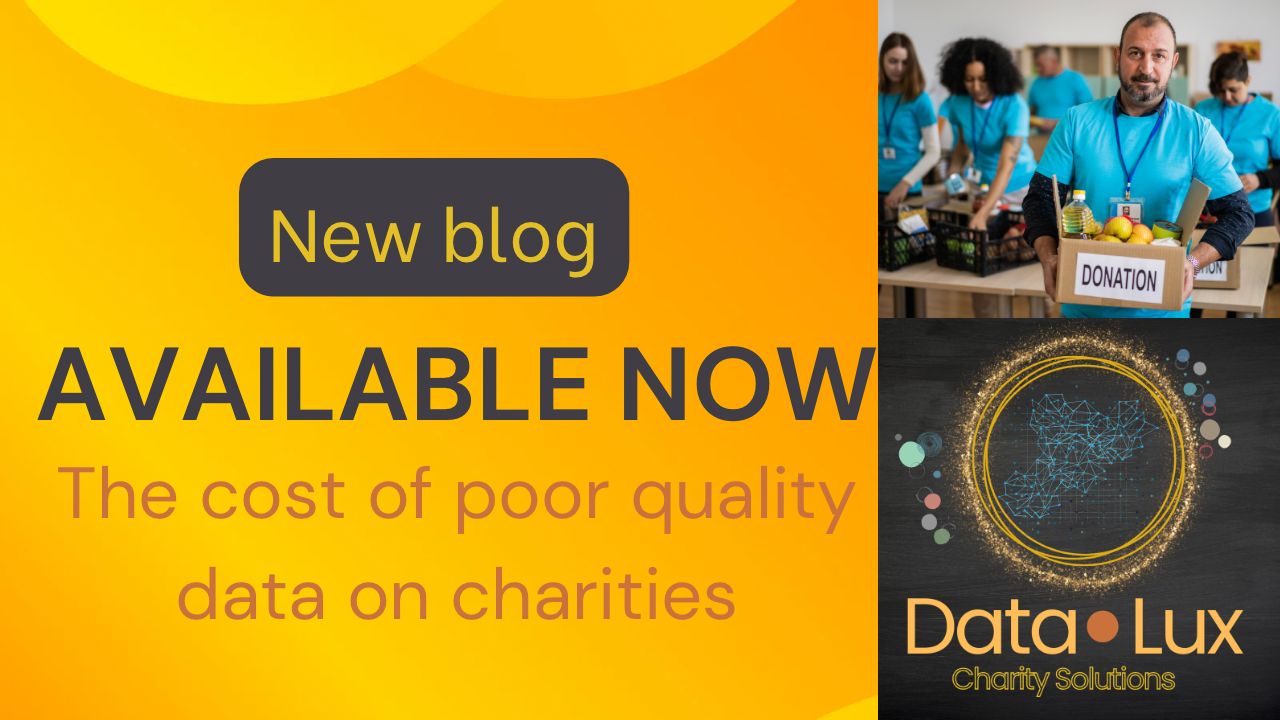For charities, maintaining accurate, clean data is essential for effective fundraising, protecting donor relationships, and ensuring efficient use of resources. However, when data is neglected or outdated, charities risk alienating supporters, missing fundraising opportunities, and damaging their reputations. Here, we explore some real-life examples where poor data quality caused issues for charities—and what lessons can be learned to avoid similar issues.
The Cost of Poor Data Quality for Charities: Lessons from Real-Life Issues - DataLux Charity Solutions
Unwanted Communications: Oxfam and Unwelcome Fundraising Requests
In 2015, several UK charities, including Oxfam and the RSPCA, came under scrutiny after an investigation revealed that elderly and vulnerable donors were being overwhelmed with repeated donation requests. A high-profile case involved Olive Cooke, a long-time charity supporter who had received hundreds of mailings and calls from charities across the UK, leading to widespread criticism of the sector’s data management practices.
The root issue lay in outdated or mismanaged data, which kept vulnerable individuals on multiple charities' contact lists despite requests to opt out or reduce communications. This incident underlined the critical importance of regular data cleansing and preference management. For charities, this kind of oversight can damage public trust and highlight a need for robust, ethical data handling practices that respect supporters’ preferences.
Data Breaches and Security Risks: RSPCA and the British Heart Foundation
In 2017, the RSPCA and the British Heart Foundation (BHF) faced significant penalties from the Information Commissioner’s Office (ICO) for mishandling donor data. These organisations were found to have engaged in “wealth screening” of donors without proper consent, as well as data sharing with other charities. The ICO fined both charities for failing to safeguard personal information, leaving supporters feeling that their data had been misused.
This case illustrates how outdated or improperly managed data practices can lead to severe regulatory consequences, as well as a loss of donor trust. It highlights the need for transparency and consent in data collection and use, as well as a proactive approach to data protection that includes regular audits and compliance checks.
Ineffective Campaign Targeting: RNLI’s Data Challenge
In 2015, the Royal National Lifeboat Institution (RNLI) ran into difficulties when an appeal to its lapsed supporters led to a surprising backlash. While attempting to reach out to past donors, the RNLI found that many of its supporter records were outdated, with mailings returned undelivered due to incorrect addresses or lapsed contact information. This led to wasted printing and postage costs, as well as frustration from supporters who felt the charity’s resources were not being efficiently used.
The RNLI’s experience underscores the importance of regular data maintenance to ensure that campaign targeting is both accurate and efficient. By keeping supporter records up-to-date, charities can avoid waste, improve donor engagement, and ensure every communication is purposeful.
Loss of Donor Trust: Confusing Communications with Cancer Research UK
Cancer Research UK (CRUK), one of the UK’s largest and most respected charities, faced challenges in 2017 with managing duplicate records across their vast database. This resulted in some donors receiving multiple messages with conflicting requests—for instance, being asked to renew a regular giving plan they had already confirmed. The mismanaged data led to confusion and frustration, and CRUK had to handle an influx of complaints from supporters.
By failing to manage duplicate records effectively, CRUK encountered issues with donor trust and engagement. This case highlights the need for deduplication and cross-database consistency to ensure communications are clear, accurate, and respectful of donors’ past interactions with the organisation.
Missed Major Donor Opportunities: A Wildlife Charity’s Data Oversight
While specific details of individual cases are rarely disclosed, it’s not uncommon for wildlife and conservation charities to miss major donor opportunities due to poor data management. For example, a large wildlife charity in the UK reportedly lost out on a potential major donation when a high-net-worth donor was overlooked due to incomplete supporter information in their database. The donor, who had been engaged with the charity for years, eventually chose to donate elsewhere.
This example highlights the potential financial losses charities face when they do not properly enrich and segment their data to identify high-potential supporters. By investing in data enrichment and segmentation, charities can make sure they’re recognising loyal supporters who might be open to giving at higher levels or to specific projects.
How to Avoid These Data Quality Risks
The above examples underscore the importance of high-quality data in building trust, reducing waste, and maximising fundraising success.
These charities are now MUCH more robust and manage data well, likely an example across the sector of a gear shift into a new era of digital cleanliness, building on new systems and times moving just so fast.
It is recognised most if not all charities wanted to do the right thing and raise money for their beneficiaries, but time, money and expensive 'systems' meant new GDPR rules have helped bring the importance of clean data into sharp focus.
Here are some essential steps for ensuring data quality and avoiding common pitfalls:
- Regular Data Cleansing and Updating: Regularly cleanse data to remove duplicates, update addresses, and ensure supporter information is accurate. This helps charities avoid costly communication mistakes and wasted resources.
- Investing in Data Security: Safeguarding personal data is a legal requirement and a responsibility to supporters. Implement strong security measures and audit data practices to protect supporter information from unauthorised access.
- Data Enrichment and Segmentation: Adding value to existing records through data enrichment—such as appending demographic data or giving histories—allows for better targeting and more personalised communication, building stronger relationships with supporters.
- Listening to Supporters: Giving supporters control over their communication preferences is key to maintaining trust. Regularly checking in with supporters and promptly actioning requests to opt-out or adjust communications prevents issues before they arise.
Final Thoughts
Poor data quality can be a barrier to achieving a charity’s financial targets, as it impacts efficiency, donor trust, and campaign success. These real-world cases illustrate that when charities prioritise data accuracy, security, and enrichment, they’re better positioned to build meaningful connections with supporters, run successful campaigns, and make a lasting impact.
If your charity is inspired to improve data quality and optimise supporter engagement, we’re here to help. By investing in data management today, you can secure a stronger foundation for tomorrow’s fundraising success and deepen the trust of your supporter community.




